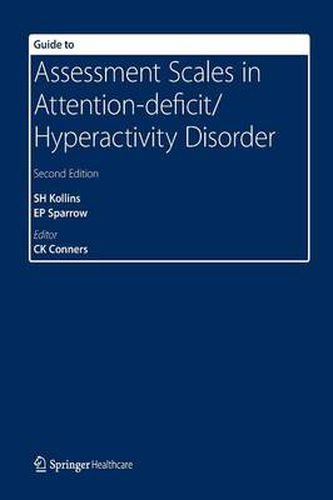Readings Newsletter
Become a Readings Member to make your shopping experience even easier.
Sign in or sign up for free!
You’re not far away from qualifying for FREE standard shipping within Australia
You’ve qualified for FREE standard shipping within Australia
The cart is loading…






This title is printed to order. This book may have been self-published. If so, we cannot guarantee the quality of the content. In the main most books will have gone through the editing process however some may not. We therefore suggest that you be aware of this before ordering this book. If in doubt check either the author or publisher’s details as we are unable to accept any returns unless they are faulty. Please contact us if you have any questions.
A comprehensive guide to the assessment scales, interviews, and questionnaires for ADHD for children, adolescence, and adults.
Written by world-renowned experts in psychiatry, specifically in ADHD. Dr Conners’ work in this book is invaluable as he is the author of the most widely used assessment scales in the field.
A follow-up of the 2003 first edition of the Guide to Assessment Scales in Attention-Deficit Hyperactivity Disorder (also written by Dr Conners and Dr Kollins)
Concise analysis of the most useful and popular scales assessing ADHD for children, adolescents, and adults.
Explains how to most effectively use the top assessment scales in ADHD for children and adults in the context of a clinical practice
Expert commentaries highlight the advantages and disadvantages of each scale, in addition to providing a discussion on how and when to administer them.
Attention-deficit hyperactivity disorder (ADHD) is the most commonly studied and diagnosed psychiatric disorder in children, affecting about 3-5% of children globally and diagnosed in about 2-16% of school aged children. Additionally, it is a chronic disorder; 30-50% of individuals diagnosed with ADHD in childhood continue to be symptomatic in adulthood. However, with early diagnosis, medical management and behavioral treatment has been most effective when treating patients with ADHD at any age.
Assessment scales are critical and essential tools for the diagnosis and treatment of patients with ADHD. This book has been designed to provide clinicians with a quick guide to the most effective assessment scales in ADHD for patients at any age. Additionally, the scales are used in clinical trials to evaluate drug efficacy.
$9.00 standard shipping within Australia
FREE standard shipping within Australia for orders over $100.00
Express & International shipping calculated at checkout
This title is printed to order. This book may have been self-published. If so, we cannot guarantee the quality of the content. In the main most books will have gone through the editing process however some may not. We therefore suggest that you be aware of this before ordering this book. If in doubt check either the author or publisher’s details as we are unable to accept any returns unless they are faulty. Please contact us if you have any questions.
A comprehensive guide to the assessment scales, interviews, and questionnaires for ADHD for children, adolescence, and adults.
Written by world-renowned experts in psychiatry, specifically in ADHD. Dr Conners’ work in this book is invaluable as he is the author of the most widely used assessment scales in the field.
A follow-up of the 2003 first edition of the Guide to Assessment Scales in Attention-Deficit Hyperactivity Disorder (also written by Dr Conners and Dr Kollins)
Concise analysis of the most useful and popular scales assessing ADHD for children, adolescents, and adults.
Explains how to most effectively use the top assessment scales in ADHD for children and adults in the context of a clinical practice
Expert commentaries highlight the advantages and disadvantages of each scale, in addition to providing a discussion on how and when to administer them.
Attention-deficit hyperactivity disorder (ADHD) is the most commonly studied and diagnosed psychiatric disorder in children, affecting about 3-5% of children globally and diagnosed in about 2-16% of school aged children. Additionally, it is a chronic disorder; 30-50% of individuals diagnosed with ADHD in childhood continue to be symptomatic in adulthood. However, with early diagnosis, medical management and behavioral treatment has been most effective when treating patients with ADHD at any age.
Assessment scales are critical and essential tools for the diagnosis and treatment of patients with ADHD. This book has been designed to provide clinicians with a quick guide to the most effective assessment scales in ADHD for patients at any age. Additionally, the scales are used in clinical trials to evaluate drug efficacy.